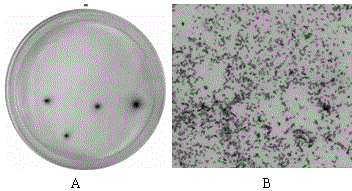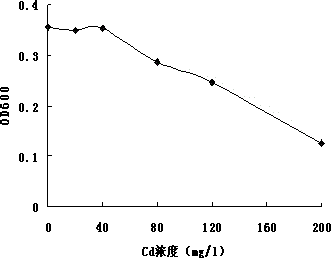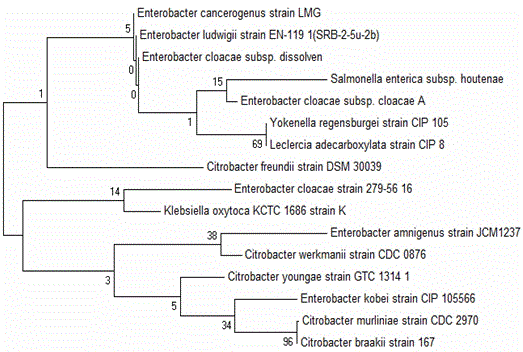Sulfate reducing bacteria-phosphate solubilizing bacteria and application thereof in combined remediation of cadmium contaminated soil
A sulfate and bacterial strain technology, applied in the field of environmental microorganisms, can solve the problems of increased Cd mobility and inhibition of wild-type SRB, and achieve the effects of increasing yield and promoting plant growth
- Summary
- Abstract
- Description
- Claims
- Application Information
AI Technical Summary
Problems solved by technology
Method used
Image
Examples
Embodiment 1
[0056] Example 1 Mutation Breeding of Efficient Cadmium Sulfate Reducing Strains
[0057] (1) The method for mutagenesis and breeding of the SRB bacterial strain provided by the invention comprises the following steps:
[0058] 1) A facultative anaerobic bacterium SRB-2 screened from Cd-contaminated soil in our laboratory was used as the starting strain;
[0059] 2) Mutation breeding
[0060] (1) Prepare the single cell suspension of the starting strain SRB-2
[0061] Inoculate the starting strain SRB-2 in liquid medium A, cover it with sterile liquid paraffin at 28-32°C, let it stand for 36 hours, centrifuge, wash with sterile saline, and place it in a Erlenmeyer flask equipped with glass beads , oscillating to disperse into a single-cell bacterial suspension;
[0062] Described liquid medium A consists of: K 2 HPO 4 0.5-0.8g, (NH 4 ) 2 SO 4 2.5-3.0g, NaHCO 3 0.3-0.5g, CaCl 2 0.2-0.3g, MgSO 4 1.0-1.5g, yeast extract 1.0-1.5g, sodium lactate 1.0-2.0ml, distil...
Embodiment 2
[0090] Example 2 Mutation Breeding of Cadmium-tolerant Phosphorus Solubilizing Strain
[0091] (1) The method for mutagenesis and breeding of the LB4-4-1c strain provided by the present invention comprises the following steps:
[0092] 1) LB-4, which was screened from the rhizosphere of plants in Cd-contaminated soil in the laboratory, was used as the starting strain;
[0093] 2) Mutation breeding
[0094] (1) Prepare a single-cell suspension of the starting strain LB-4
[0095] Inoculate the starting strain LB-4 in liquid medium C, culture at 28-32°C, 150-180rpm for 8-12 hours, centrifuge, wash with sterile saline, place in a Erlenmeyer flask with glass beads, shake, Make it dispersed into a single-cell bacterial suspension;
[0096] The composition of the liquid medium C is: tryptone 5-10 g, yeast powder 3-5 g, NaCl 5-10 g, distilled water 1000 ml, pH value 6.8-7.5, sterilized at 121°C for 20 minutes.
[0097] (2) Ultraviolet mutagenesis
[0098] Adjust the concentrat...
Embodiment 3
[0125] Example 3 Determination of SRB-2-5u-2b reducing sulfate activity
[0126] Inoculate SRB-2-5u-2b into a test tube containing 10ml of liquid medium A, cover it with liquid paraffin, and culture it statically at 35°C for 20 hours, take 100 μl (dilute the bacterial solution with liquid medium A to make its OD600 0.3) Bacterial solution was inoculated in liquid medium A at 35°C, under anaerobic or aerobic conditions, and cultured statically for 7 days, and the sulfate reduction activity was determined by barium sulfate precipitation method. The anaerobic conditions are as follows: add 200ml of liquid medium A to the anaerobic culture bottle, insert SRB-2-5u-2b into the anaerobic culture bottle respectively, and add 20ml of liquid paraffin sealing solution on the liquid surface On the other hand, culture at 35°C in an anaerobic glove box for 7 days; the aerobic conditions are as follows: add 200ml liquid medium A to the Erlenmeyer flask, insert SRB-2-5u-2b under aerobic con...
PUM
| Property | Measurement | Unit |
|---|---|---|
| diameter | aaaaa | aaaaa |
| diameter | aaaaa | aaaaa |
Abstract
Description
Claims
Application Information
 Login to View More
Login to View More - R&D
- Intellectual Property
- Life Sciences
- Materials
- Tech Scout
- Unparalleled Data Quality
- Higher Quality Content
- 60% Fewer Hallucinations
Browse by: Latest US Patents, China's latest patents, Technical Efficacy Thesaurus, Application Domain, Technology Topic, Popular Technical Reports.
© 2025 PatSnap. All rights reserved.Legal|Privacy policy|Modern Slavery Act Transparency Statement|Sitemap|About US| Contact US: help@patsnap.com



